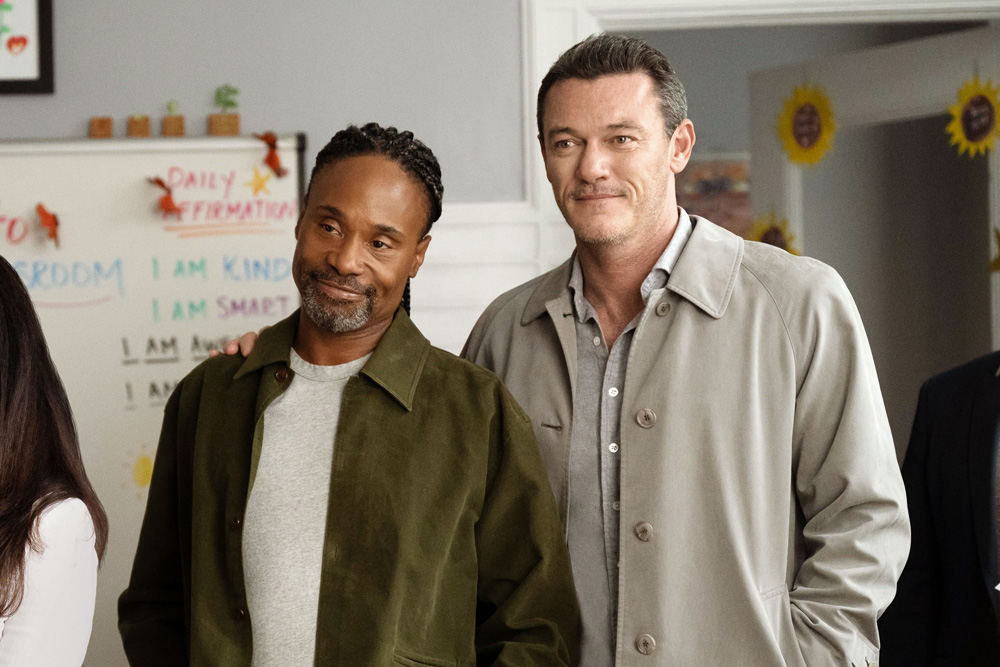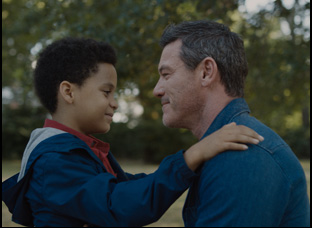It’s only a matter of time before Nick (Luke Evans) and Gabriel (Billy Porter) split up in “Our Son,” the end of their marriage arriving as neither of them notice but their friends might as they talk about each other over a dinner party. The fact Gabriel has lost all interest in asking about Nick’s day after having to spend all of his taking care of their eight-year-old Gabriel (Christopher Woodley) is another indication and soon enough, they’re in divorce court after Gabriel confesses he’s been seeing someone else. Director Bill Oliver, working with co-writer Peter Nickowitz, doesn’t waste time suggesting the two are going to salvage things romantically after retaining counsel, but you are left to wonder what’s to become of Gabriel as they do their best to shield him from their increasingly contentious interactions and subtle broadsides about one another in their private time with him.
With gay marriage only legalized relatively recently, the effects of a divorce on a same-sex partnership have been less explored on the big screen than that of a heterosexual couple and “Our Son” finds drama in the nuances. Although nothing about the proceedings is out of the ordinary, the conflict itself takes on different dimensions when Nick, who has been able to afford the family’s luxury apartment in Manhattan with a high-powered job in book publishing, appears to adhere to more conventional notions regarding gender roles in a relationship and ideas about raising a son than his husband, who put aside a career in acting to take care of Owen. As the two start to no longer recognize each other, it is considerably easier to see oneself in them as they hold onto ideas of who they once were to one another that prevent them from seeing who they are at a moment that neither fathomed and “Our Son” artfully reflects the shifting dynamics of the relationship, not only in Evans and Porter’s performances but in the amount of light their characters let into the home they have built together over the years.
With the film’s premiere at Tribeca, Oliver spoke about returning to the festival where he previously saw success with the sci-fi drama “Jonathan” and tackling such a highly charged drama, working with unexpected actors in the leads and what it was like bringing the production into the streets of New York.
After my first feature with my writing partner, we wanted to do something that was a little closer to home about our community and something we hadn’t seen before, which is two men raising a child and going through a divorce, still trying to be good parents and figuring it out for the sake of the child. So it was a chance for us to do a film with gay characters in the lead and explore some other themes that are meaningful to us.
One of the things that I really admired about this that I hadn’t seen before on screen was this idea of masculinity in relation to domestic roles or being a father to a son when both parents are men. Was that an interesting thing to work out?
Yes, one of the things we realized in the writing and also throughout the filming and editing is that we’re watching two men raise a child, so that does bring up thoughts and questions, just seeing two men in a domestic space. They have different parenting styles maybe, but they’re both expressing love for the child in their own way and being very vulnerable throughout the divorce process, so it was exciting to me too, and important to show that men can be emotional and nurturing and it’s okay.
You’ve said you consulted with some attorneys on this for the story and when the narrative’s attached to a process, was that was an illuminating aspect of this?
Yeah, neither my writing partner nor I are divorced. We know people who have gone through that and we’ve been through breakups. I have two sons and I’ve been through a breakup while trying to help raise them, so in that sense it was personal and we could draw on our own experiences. But it was very important to us to get the legal proceedings aspect of it correct, and also how it feels to go through a divorce, so we talked to people who’ve gone through divorce and divorce attorneys. I have a good friend who’s a family attorney who was a legal advisor on the film and really helped me down to lines of dialogue and understanding procedurally how it all works, what’s the progression, and when does [a case] go to court. It’s a very complex process and it’s very different for each couple.
Luke Evans and Billy Porter are both very versatile actors, but they wouldn’t necessarily be the first people to come to mind for a domestic drama like this. How did they come into the picture?
Yeah, for me as a director, it’s always exciting to work with actors who are known for one thing or a certain style of performance, and then they’re going to bring something different and to [be the one to] help them bring that out. When Billy read the script, he was very interested in doing it, and we met via Zoom and he talked about having a quiet and more domestic side that he wanted to show people, and I was hoping for that because we’ve seen him on stage and on “Pose,” which are larger than life [parts]. I knew he could go there, but I also was excited to see him in a more intimate space. And Luke has done all these action films and has an incredible body of work that’s so diverse, so this was exciting for me but also for him and a little bit scary, I would say to be honest. More for him, I had confidence, but to be in something so everyday and emotional, I was so proud of him for bringing him out and not holding back.
Once you get the two of them in a room together, is there anything you see in their relationship that takes it in a direction you didn’t expect?
Yeah, one of the things about casting romantic leads, you never know if there’s going to be chemistry there. I didn’t have the luxury of doing a chemistry read before I decide whether to go with them, so it was a bit of a leap of faith. But as soon I got them together the three of us on a Zoom and they met, I could see that the chemistry was there and that we were good because although they hadn’t met, they have a lot of shared experiences. They’re both musicians and both have been in musical theater and come from stage, so they were great together. And I encouraged them to get to know each other and spend time together socially as much as they could prior to filming so that the relationship would feel somewhat lived in.
What was it like to add Christopher Woodley, the young actor that played their son Owen into the mix?
My casting director, Scotty Anderson saw hundreds of kids and then filtered it down and we had a few kids come back for a chemistry read with Luke and Billy by Zoom. That’s when it was very clear that this particular actor, Christopher, was the right one and I was hoping they would feel the same. We were looking for a child of that age who felt that age of an eight-year-old because it’s very particular, and I wanted the vulnerability, the charm, but also the realness. He’s had some professional experience, but not too much, so it was great and he was wonderful.
You use the apartment in a really interesting way as a reflection of the relationship, so how did you decide upon that space, but also the shooting style where you embrace shadows?
It was important that we shoot on location rather than a set because I felt stylistically it was correct for this film to shoot it in as realistic a style as possible. I wanted the audience to really believe that this was a real family — these queer families exist because they do, but also to make them look good and elevate them through beauty because that’s how I felt about them. They’re a beautiful family despite their flaws. So I found a DP [Luca Fantini] who was masterful at shooting handheld, he operates himself, but in a very controlled way, and then uses mostly available light. We barely brought in any lights. It was window light and practical lights, which helped us move quickly and was budget friendly, but it also really helps the performers because they’re not tripping over lights or having to hit marks. They can really feel like that apartment was theirs, and we kept the crew small too, for that reason.
It also makes the exteriors really feel quite airy. Was that contrast something you were pretty conscious of?
Yes, that’s something you have to think about a lot. It’s a very interior movie, but I didn’t want it to feel claustrophobic, and exterior scenes are a little bit harder because you can’t control the environment, especially on a modest budget. But chance worked in our favor too because at one point, the scene where they go to the beach in Coney Island was conceived as an aquarium, and we couldn’t get it, but it actually was much better to have them go outside [in] the sunshine because you have been so inside so much, and then a scene towards the end of the movie became a picnic, and that was not planned. It was like, “Oh, it’s so nice to just feel the air and other people around them,” especially as we’re kind of coming to the end of the movie because I wanted the audience to come away from it not feeling depressed, but feeling hopeful.
I wouldn’t want to spoil the context, but there’s a scene where Luke Evans is walking through the busy New York streets at night that I have to imagine was difficult to pull off.
It was, and that was the last night of filming, and literally the last shot that we filmed. But he’s a one-take wonder. He nails it after one or two takes, so we just found a block. It was just a few of us there, a steadicam, and we just said “Go,” two or three times and hoped that not too many people would look at him or look into the camera. We just did it fast and then we wrapped him right there on the sidewalk in Bushwick and brought out the champagne. It was very much in the style of making this movie. It was almost a guerrilla moment, which was cool. And [Luke] was loving it. He’s done so many bigger budget things and he said he had the best time making this film because the crew was just so sweet and supportive and just had a real family feeling that he hadn’t got from any of his other productions.
What’s it like to bring to Tribeca?
It’s great. It’s kind of hot off the press, but I’ve been excited to share it with everyone and it’s my second time at Tribeca. I live in New York, and I’ve been here for 20 years, so it’s like home for me, and there’s a lot of friends and family here, which is great, because the movie’s about family, so I’m thrilled.
“Our Son” will screen at Tribeca Festival at the Village East on June 11th at 3:30 pm and June 14th at 8:30 pm.





